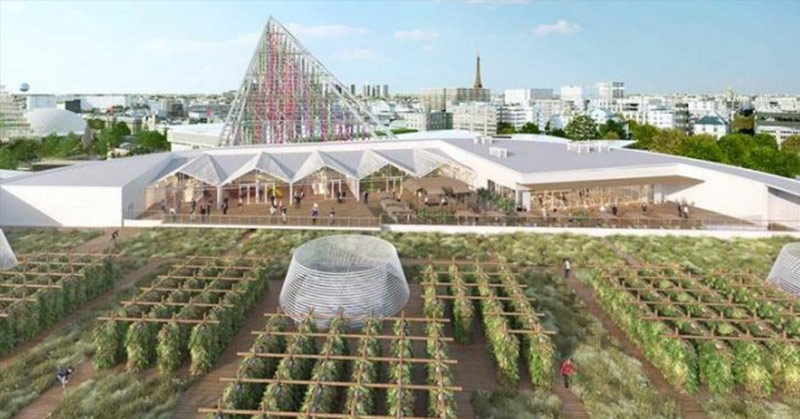Imagine you’re in the middle of a massive, sprawling city- a concrete jungle, as they say. You step out onto the roof of a large building, and find not an empty, concrete rooftop as you might expect, but instead a sprawling greenspace filled with trees, bushes, and vines growing a variety of fruits and vegetables.
That scene may sound like a dream, but it is soon to become a reality in Paris, France, when the world’s largest rooftop farm is open for business.
The World’s Largest Rooftop Farm
At 150 690 square feet, ths organic rooftop farm in the southwest corner of one of the world’s most visited cities will be roughly the size of three football fields [1].
The farm will be located on top of a major exhibition complex in the fifteenth arrondissement called the Paris Expo Porte de Versailles, and will feature its own on-site restaurant and bar with the capacity to seat three hundred people. Diners will be able to choose from dishes that feature produce that was grown on site, while enjoying panoramic views of the nation’s capital [2].
More than thirty different plant species will be grown in the footop garden, which will produce one metric tonne of fruit every day during the high season. Not only will this produce be used to supply the restaurant, but will also be available for local residents in southwest Paris [1].
Pascal Hardy is the founder of the urban-farming company Agripolis, which is the organization behind the project. He wants to improve the food availability for local residents, while still making the farm commercially viable and environmentally sustainable.
“Our fresh produce will be used to feed the inhabitants across the south-west of the city – either directly, through veg-box schemes or via shops, hotels and canteens – thereby helping to reduce food miles,” Hardy says [2].
Read: First Floating Ocean Hybrid Platform Can Generate Power From Waves, Wind And Solar
A Sustainable Farming Method
Hardy says that the goal of the project is to make the farm a globally recognized model for sustainable production. It will use advanced water technology, and does not require soil, which will allow the farm to use resources extremely efficiently [1].
“We’ll be using quality products, grown in rhythm with nature’s cycles, all in the heart of Paris,” says Hardy [1].
While not the first rooftop farm to exist, this one will be innovative in many ways. Agripolis will be launching their own technique in aeroponic vertical farming. No pesticides will be required, and the farm will use a closed water system which will reduce the risk of any pollutants. Additionally, because the produce will be going to people who live in the immediate area, the carbon footprint of the farm will be significantly smaller than that of a traditional farm [2].
Read: IKEA Released Free Design For Garden Sphere That Feeds a Neighborhood
The Benefits of Urban Farming
The average meal has to travel 4200 miles to get to your table, which has a significant impact on the environment. By having farms right in the heart of urban centers, where the majority of consumers live, the distance food has to travel is drastically reduced, therefore shrinking the carbon footprint of your meal.
Given that an urban setting is a unique environment, urban farms require unique solutions to common problems like waste management, space utilization, resource management, and energy efficiency. This results in the creation of more inventive problem-solving, which leads to better quality and quantity of food while using the least amount of resources [3].
Urban farms also bring jobs to a community, fuel economic growth, help build communities, and improve public health by making healthy food more accessible to people living in urban centers. They improve food quality in the area, as well as food security, and they provide much-needed green space that can cool and clean the atmosphere in the city and balance out carbon emissions produced by human activity [1,3].
Finally, urban agriculture takes advantage of previously unused, vacant spaces. In theory, any flat rooftop in a city could serve as a plot for an urban farm [1].
The Vision for the Future
Hardy’s vision is one in which every flat roof and abandoned surface are covered in these unique growing systems.
“Each will contribute directly to feeding urban residents who today represent the bulk of the world’s population.” [2]
Once open, the farm will be offering educational tours, team-building workshops, and special events. Local residents will also have the opportunity to lease their own small vegetable plots to help them re-connect with where their food comes from [1].
Paris already has other agricultural sites throughout the city, including the eco-farm La Recyclerie, and the underground organic mushroom La Caverne, and has committed to planting 100 hectares of vegetation throughout the city by the end of this year. This new project was originally planned to be open by April 2020, but closures due to the COVID-19 pandemic have set them back, and the farm is not yet available to the public.
There are several other spaces around the city that are expected to get their own agricultural plots, and by this time next year, Paris may be the world leader in urban agriculture.
Keep Reading: Hospital Grows Organic Rooftop Garden

